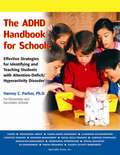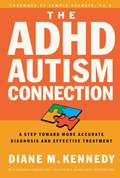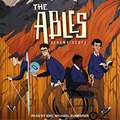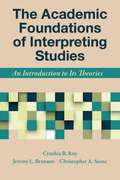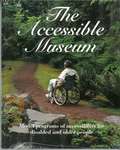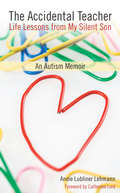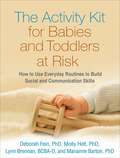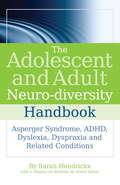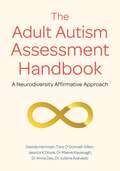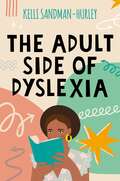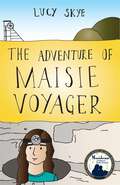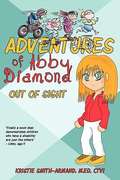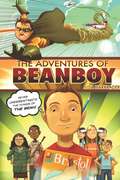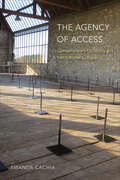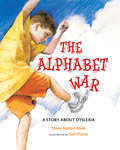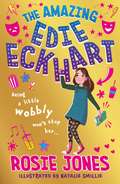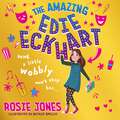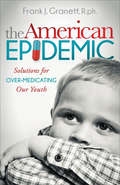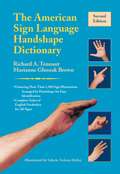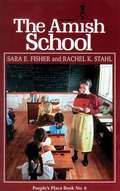- Table View
- List View
The ADHD Handbook for Schools: Effective Strategies for Identifying and Teaching Students with Attention-Deficit/Hyperactivity Disorder
by Harvey C. ParkerEducators in regular and special education settings who teach students with ADHD will appreciate this classroom-focused guide to ADHD that discusses specific teaching strategies and provides a thorough history of the disorder. The most up-to-date knowledge about ADHD characteristics, diagnosis, contributing factors, and medical and psychosocial treatments is comprehensively detailed. Suggested teaching techniques and tips for improving learning and behavior in the classroom include strategies for developing partnerships with parents of ADHD students, a listing of support groups and resources for parents, and specific tools for assessment, such as rating scales and history forms.
The ADHD Toolkit
by Ms Linda WheelerAre you struggling with students who have ADHD (Attention-Deficit Hyperactivity Disorder)? There is likely to be at least one student in any mainstream class with ADHD, an evolving concept that affects pupils' learning, concentration, behaviour and social relationships. In order to offer effective support and maximize the learning potential of all students in your classroom you will need to understand the different needs of all children, but perhaps especially those with ADHD. With sections covering the background to ADHD, the school setting and the wider context of home life, this complete resource ensures excellent practice for working with students with ADHD. It provides: - examples of successful tried-and-tested strategies - activities to use with children - checklists - information on referral pathways - advice on working with parents - case studies to facilitate discussion A substantial bank of electronic resource materials is available from the SAGE website to use with the book, including PowerPoint presentations and a range of photocopiable sheets. Packed with the most up-to-date information and rooted in real-life examples from the author's own experiences and research, this is the complete resource you need to help you work successfully with students who have ADHD. Every class teacher, SENCO and teaching assistant in a primary or secondary school will find this an invaluable and supportive guide. Linda Wheeler is an independent education consultant and researcher, having been for many years a teacher in both mainstream and special schools. She is currently a part-time Lecturer at the University of Worcester.
The ADHD-Autism Connection: A Step Toward More Accurate Diagnoses and Effective Treatments
by Diane KennedyAt last, long-awaited answers to the questions you've been asking. Help for frustrated ADHD patients and their families. (As well as those with autism, PDD, Asperger's syndrome, and other related conditions.) Attention deficit/hyperactive disorder (ADHD) is one of the most rapidly growing diagnoses of our generation. Often the diagnosis fails to provide real help, leaving patients, doctors, and families at a loss to know what to do next. But for the first time ever, new insights into the overwhelming number of similarities between Autism and ADHD are giving those with ADHD genuine hope. For years, the label of Autism has carried a negative connotation. Parents were afraid to admit the diagnosis and banished the term from discussion. Finally, The ADHD-Autism Connection gives parents, educators, and doctors a reason to embrace autism with a renewed sense of hope and understanding. This book will show how these understandings can minimize the frustration, misdiagnoses, and misunderstandings ADHD sufferers and their families face.From the Trade Paperback edition.
The Abacus Made Easy: A Simplified Manual for Teaching the Cranmer Abacus
by Mae E DavidowFrom the book: At Overbrook, [School for the Blind] Dr. Davidow was instrumental in establishing the use of the Cranmer Abacus as a part of the regular curriculum. Her enthusiasm for this pioneer method of teaching mathematics led others to adopt the use of the abacus. In her role as coordinating teacher, she worked with the members of the Mathematics Department and the results were highly successful. Hopeful that this success at Overbrook might be experienced by many teachers elsewhere, she was encouraged to write this manual. Her goal was to write a clear, simple manual which could be used by teachers or students. This book represents her achievement.
The Ables
by Jeremy ScottI did have fantastic hearing, mostly by virtue of being blind. But that couldn't actually mean that he's trying to tell me I have super powers, right? Because that would be ridiculous. <p><p> It wasn't the "sex talk" he expected. Phillip Sallinger's dad has told him he's a custodian - a guardian - and his genetically inherited power is telekinesis. He'll learn to move objects with his mind. He's excited to begin superhero high school until he discovers he's assigned to a "special ed" class for disabled empowered kids; he suddenly feels like an outsider. Bullied, threatened, and betrayed, Phillip struggles, even as he and his friends - calling themselves the Ables - find ways to maximize their powers to overcome their disabilities, and are the first to identify the growing evil threatening humanity. As vital custodians disappear and the custodian leadership is mired in indecision, a mysterious and powerful figure taunts Phillip, and the enemy is poised to strike. But what if the next "one who does all," the multi-gifted custodian predicted to come, is one of the Ables? <p><p> The Ables is a fast-paced, captivating debut novel from Jeremy Scott, a bold, new voice in fantasy and science fiction.
The Academic Foundations of Interpreting Studies: An Introduction to Its Theories
by Cynthia B. Roy Jeremy L. Brunson Christopher A. StoneThe Academic Foundations of Interpreting Studies is the first introductory course book that explores the theoretical foundations used in sign language interpreting studies. Authors Roy, Brunson, and Stone examine the disciplines whose theoretical frameworks and methodologies have influenced the academic study of interpreting. With this text, explanations for how interpreted events occur, how interpreted products are created, and how the interpreting process is studied can be framed within a variety of theoretical perspectives, forming a foundation for the emerging transdiscipline of Interpreting Studies. As sign language interpreting has emerged and evolved in the last 20 years as an academic field of study, the scope of learning has broadened to include fields beyond the language and culture of deaf people. This text surveys six disciplines that have informed the study of sign language interpreting: history, translation, linguistics, sociology, social psychology, and cognitive psychology, along with their major ideas, principal scholars, and ways of viewing human interaction. Each chapter includes clear learning goals, definitions, discussion questions, and images to aid understanding. The Academic Foundations of Interpreting Studies is required reading for upper-level undergraduate or first-year graduate students in interpreting, Deaf studies, and sign language programs.
The Accessible Museum Model Programs of Accessibility for Disabled and Older People
by American Association of MuseumsA very interesting guide to museums of all kinds, which cater to accessibility for disabled and older people.
The Accidental Teacher: Life Lessons from My Silent Son
by Annie Lubliner LehmannA mother's honest, unvarnished, and touching memoir about the life lessons she learned from a son with autism
The Activity Kit for Babies and Toddlers at Risk
by Molly Helt Deborah Fein Lynn Brennan Marianne BartonSuspecting that your baby or toddler may have autism spectrum disorder or another developmental delay can be scary and overwhelming. But there is a lot you can do to help, even while waiting for an evaluation or early intervention. With the right tools, everyday tasks can be terrific opportunities for building critical social and communication skills. Start at the kitchen table, bathtub, or shopping cart! In this easy-to-navigate guide, leading experts present more than 100 games and activities designed to support development in children from birth to age 3. Your child's daily routines are transformed into learning opportunities that promote crucial abilities, like how to imitate others or use simple hand gestures to convey wants and needs. As a parent, you are the most important person in your child's life. Now you can be the best teacher, too.
The Adolescent and Adult Neuro-diversity Handbook: Asperger Syndrome, ADHD, Dyslexia, Dyspraxia and Related Conditions
by Sarah Hendrickx Claire SalterIncreasing numbers of adults are realising that they have been living with an undiagnosed developmental condition, yet most information and support focuses on children. This leaves many adults confused and in the dark. The Adolescent and Adult Neuro-Diversity Handbook is a handy first-reference point guide to the full range of developmental conditions as they affect adolescents and adults. Each chapter focuses on a different condition, describing its history, causes and characteristics, its implications for the individual, diagnosis and assessment, treatments and approaches, and strategies for providing support and self-support. A wide range of conditions are covered, including Autistic Spectrum Disorders, Dyslexia, Dyspraxia, ADHD, OCD, Tourette's and Anxiety Disorders. The Adolescent and Adult Neuro-Diversity Handbook is an invaluable resource for health and social care practitioners, as well as for individuals who feel that they may be living with an undiagnosed developmental condition.
The Adolescent and Adult Neuro-diversity Handbook: Asperger Syndrome, ADHD, Dyslexia, Dyspraxia and Related Conditions
by Sarah HendrickxIncreasing numbers of adults are realising that they have been living with an undiagnosed developmental condition, yet most information and support focuses on children. This leaves many adults confused and in the dark. The Adolescent and Adult Neuro-Diversity Handbook is a handy first-reference point guide to the full range of developmental conditions as they affect adolescents and adults. Each chapter focuses on a different condition, describing its history, causes and characteristics, its implications for the individual, diagnosis and assessment, treatments and approaches, and strategies for providing support and self-support. A wide range of conditions are covered, including Autistic Spectrum Disorders, Dyslexia, Dyspraxia, ADHD, OCD, Tourette's and Anxiety Disorders. The Adolescent and Adult Neuro-Diversity Handbook is an invaluable resource for health and social care practitioners, as well as for individuals who feel that they may be living with an undiagnosed developmental condition.
The Adult Autism Assessment Handbook: A Neurodiversity Affirmative Approach
by Davida Hartman Tara O'Donnell-Killen Jessica K Doyle Dr Maeve Kavanagh Dr Anna Day Dr Juliana AzevedoAdult autism assessment is a new and fast-growing clinical area, for which professionals often feel ill-equipped. Autistic adults are often misdiagnosed which has enormous implications for their mental health.This accessible and comprehensive adult autism assessment handbook covers the most up to date research and best practice around adult autism assessment, centering the person's internal experiences and sense-making in clinical assessment, rather than subjective observation, thus providing the clinician with a truly paradigm shifting Neuro-Affirmative approach to autism assessment. Traditional clinical assessment tools are comprehensively explored and unpacked to enable the clinician to have full confidence in aligning traditional criteria to the Autistic person's subjective experiences.Full of additional resources like language guidelines and an exploration of the common intersections between Autistic experience and the effects of trauma, mental health and more, this book supplies a breadth of knowledge on key areas that affect Autistic adults in everyday life.The mixed team of neurotypical and neurodivergent authors describe lived experience of Autistic adults, a how-to for conducting Neuro-Affirmative assessments and post-assessment support, alongside reflections from practice. This book also has a directory of further resources including downloadable forms that you can use to prepare for your own assessments and a downloadable deep dive into Autistic perception. This guide will also support professionals through every step of the assessment process.
The Adult Side of Dyslexia
by Kelli Sandman-HurleyThis book combines moving accounts of the lived experience of dyslexic adults with tips and strategies for surmounting the challenges you or a loved one or family member may face. Drawing on in-depth interviews, Kelli Sandman-Hurley explores common themes such as school experiences; the impact of dyslexia on mental wellbeing; literacy skills; and being a dyslexic parent, perhaps to a child who is also dyslexic. Interviewees share what helped them (or didn't), the strategies they use daily to tackle literacy-based tasks, anxiety and low self-esteem, the advice they would give to the parent of a dyslexic child who is struggling, and reflect on how their experience has impacted their own parenting style. Whether you're dyslexic yourself or supporting someone who is, this book sheds light on an underrepresented topic, providing much-needed guidance and insight around what life is really like for an adult with dyslexia.
The Adventure of Maisie Voyager
by Lucy SkyeMaisie Voyager used to explore the world with her parents. She now lives in a tall town house with Aunt Hetty, experiencing 'normal' life. But strangers start appearing, cryptic messages are left, and Aunt Hetty is kidnapped! Following a trail of clues that leads her to abandoned tin mines and a hunt for treasure, Maisie discovers that evil Dr Gallows and his gang have taken her family hostage and it's up to her to save them. Facing many challenges along the way including sinister strangers, cold dark tunnels and the colour purple, Maisie has a big adventure ahead of her with big decisions to make. Suitable for children aged 9+ this captivating novel is a great read and offers a positive heroine with a unique outlook on life that all children will relate to, especially those on the autism spectrum.
The Adventures of Abby Diamond: Out of Sight
by Kristie Smith-ArmandAbby Diamond is an eleven-year-old girl who loves to solve the mysteries that surround her and her three best friends: Neils, Andrea and Alison. Being blind does not stop this girl detective from solving the mysterious cases that happen in her home and at school. Abby is smart, self-reliant and ready to take on any problems that come her way along with her friends a.k.a The Three Musketeers. Neils-- An adorable redhead who is Abby's best friend and a tomboy by heart. If anyone loves a mystery better than Abby it is Neils. Andrea-- A tall striking dark-skinned young girl who has both beauty and brains. Andrea is the leader of The Three Musketeers who never fails to have a successful ending. Alison-- A quiet innocent girl who is the daughter of a famous movie star, Kaitlyn Summers. Although Alison has experienced the lifestyle of the rich and famous, she much prefers to live with her adopted dad, Audie who manages the school cafeteria. Join Abby and her friends while they discovers the mysteries of anonymous Braille notes, a missing parent, a haunted doll, neighborhood break-ins, but most of all, finding the true meaning of happiness in any situation.
The Adventures of Beanboy
by Lisa HarkraderNever underestimate the power of the bean. <P><P>Tucker MacBean has been drawing comic books almost as long as he's been reading them. When his favorite comic has a contest for kids, he hopes he has finally found a way to fix his family--all he has to do is create the winning superhero sidekick . . . <P><P>Introducing "Beanboy"--the first comic book character to truly harness the power of the bean for good. He is strong, he is relentless, he can double in size overnight (if given enough water). <P> With thoughtful characterizations and copious comic book illustrations, this laughout-loud novel will have readers rooting for a superhero with true heart.
The Agency of Access: Contemporary Disability Art & Institutional Critique
by Amanda CachiaThe Agency of Access examines how access can be employed as a methodology for curating art exhibitions using a multi-sensorial approach. Crip curator and art historian Amanda Cachia illustrates how bodies take in information and process stimuli, making the inequities in museums and galleries more transparent. She also argues that, as contemporary disabled artists move away from representations of disability, they create an art of access, or access aesthetics, through works that center translation, sensory expansion, touch, and movement for audiences and offer an experience of “being with” disability. Showcasing artwork by contemporary disabled artists Corban Walker, Christine Sun Kim, and Carmen Papalia, among others, The Agency of Access inscribes contemporary disability art in the broad canon of contemporary art, where the artistic past is regarded differently. Cachia is an outspoken advocate for artists living with sensory disabilities. She understands disabled artists’ experiences in both the world and the gallery. The artists she has curated make bold, astonishing, and compelling statements about interdependency, care, and the ways in which our environment affects disabled, ill, and immunocompromised bodies.
The Alphabet War
by Gail Piazza Diane Burton RobbWhen Adam started kindergarten, the teacher wanted him to learn about letters. But "p" looked like "q," and "b" looked like "d." Adam would rather color or mold clay. In first grade, his teacher wanted him to put the letters into words so he could read. That was the beginning of the Alphabet War. "Was" looked like "saw," and "there" looked like "then." Almost everyone else in his class was learning to read, but Adam was fighting a war against letters. In second grade, he had to learn to spell, which was also impossible. Now he was so frustrated he got into trouble and had to go to the principal's office. At last, in third grade, he got the right kind of help. Slowly he began to do better. During fourth grade, he learned that he could excel in other things. That gave him the confidence to take chances with reading. One day he found himself reading a book all by himself!
The Aluminum Turtle (Duncan Maclain Mystery #11)
by Baynard KendrickDuncan Maclain is in Tampa with his wife, Sybella, and his partner, Spud Savage and his wife, Rena, to visit with old friends and investigate a murder. It has been seven years since his old friend, Ronald Dayland, Sr. had been murdered. The killer had never been brought to justice and his wife has remarried...to Jack Manning. Baynard Kendrick has been largely forgotten, but he was a founding member of the Mystery Writers of America. He worked with the blind for years, and created the blind private investigator, Captain Duncan Maclain, to prove that blind folks weren't completely helpless, like most folks believed.
The Amazing Edie Eckhart: Book 1 (The Amazing Edie Eckhart)
by Rosie JonesA sparky middle-grade series from TV comedian Rosie Jones. Perfect for fans of Jacqueline Wilson and DORK DIARIES.'Fresh, funny and ultra cool' - Jacqueline Wilson Hello! My name is Edie Eckhart and I'm eleven years old. I'm a little bit different. I have a disability called cerebral palsy, so I talk slowly and fall over a lot. It's never really bothered me because I've never known anything else.Edie Eckhart is Excited with a capital E to start secondary school with her best friend Oscar - the fish to her chips, the bananas to her custard. But when she and Oscar are put into different tutor groups on their first day, Edie is devastated. Who will play secret hangman with her in class? Who will she eat sausage rolls with?But while she's plotting her reunion with Oscar, she accidentally gets cast as the lead in the school play. As Edie discovers a passion for performance, she also finds new friendships, talents, and dreams. After all, it's easy to shine on and off the stage when you're Amazing with a capital A.'This book is as funny and warm as a sausage roll. I loved it!' Jenny McLachlan, author of Land of Roar'Enjoyable and uplifting. Everyone needs an Edie Eckhart in their lives.' Jen Carney, author of The Accidental Diary of B.U.G
The Amazing Edie Eckhart: Book 1 (The Amazing Edie Eckhart)
by Rosie JonesA sparky middle-grade series from TV comedian Rosie Jones. Perfect for fans of Jacqueline Wilson and DORK DIARIES.'Fresh, funny and ultra cool' - Jacqueline Wilson Hello! My name is Edie Eckhart and I'm eleven years old. I'm a little bit different. I have a disability called cerebral palsy, so I talk slowly and fall over a lot. It's never really bothered me because I've never known anything else.Edie Eckhart is Excited with a capital E to start secondary school with her best friend Oscar - the fish to her chips, the bananas to her custard. But when she and Oscar are put into different tutor groups on their first day, Edie is devastated. Who will play secret hangman with her in class? Who will she eat sausage rolls with?But while she's plotting her reunion with Oscar, she accidentally gets cast as the lead in the school play. As Edie discovers a passion for performance, she also finds new friendships, talents, and dreams. After all, it's easy to shine on and off the stage when you're Amazing with a capital A.
The American Epidemic: Solutions for Over-Medicating Our Youth
by Frank J. GranettThe American Epidemic: Solutions for Over Medicating Our Youth provides new knowledge for parents, educators, all healthcare professionals, and public health policymakers to help rule out underlying risk factors of behavioral conditions prior to premature drug therapy. Nutritional, physiological, and environmental risk factors have created a behavioral health crisis in America. The American Epidemic: Solutions for Over Medicating Our Youth reveals how to eliminate these risk factors and revert children to normal behavior without drug therapy. Also discussed is the prudent use of drug therapy protocols to prevent harmful side effects.
The American Sign Language Handshape Dictionary
by Richard A. Tennant Marianne Gluszak BrownThis unique reference can help users locate a sign whose meaning they have forgotten, or help them find the meaning of a new sign they have just seen for the first time. It organizes more than 1,900 ASL signs by 40 basic handshapes and includes detailed descriptions on how to form these signs to represent the different English words that they might mean. Users can begin to track down a sign by determining whether it is formed with one hand or two. Further distinctions of handshape, palm orientation, location, movement, and nonmanual signals help them pinpoint their search while also refining their grasp of ASL syntax and grammar. A complete English word index provides the option of referring to an alphabetical listing of English terms to locate an equivalent sign or choice of signs. This dictionary features: More than 1,900 sign illustrations, organized by handshape Complete index of English vocabulary for all signs An introduction to Deaf culture and ASL structure The American Sign Language Handshape Dictionary is a one-of-a-kind resource for learning ASL and enhancing communication skills in both ASL and English.
The Americans with Disabilities Act (2nd edition)
by Margaret C. JasperIn the past, disabled individuals have faced a wide variety of obstacles that prevented them from fully participating in all that American society has to offer. They have struggled with obtaining employment, and have been denied access to many services most Americans take for granted. In this publication, Margaret C. Jasper examines the Americans with Disabilities Act (ADA) and discusses the rights disabled individuals are entitled to under the statute. This easy-to-use resource is packed with facts on areas governed by the ADA including employment, public entities and transportation, public accommodations, state and local government services and telecommunications. Ideal for anyone interested in this area of law, this newly revised second edition includes coverage of the latest information regarding the ADA.
The Amish School (1st Ed.)
by Rachel Stahl Sara FisherFrom the Book jacket: This authoritative book on Amish education deals with many questions Why do the Amish have their own schools? What goals do Amish teachers have for their scholars? How are teachers chosen? How are the parents involved? What curriculum materials are used? What about children with special ne(dsr? Co-author Sara Fisher writes from her experienceas an Amish school teacher; coauthorRachel Stahl writes from her years of extensive research.
